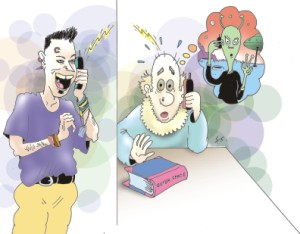|
Trends
 |
Cartoon by Shahriar Sharif |
Communicating Shortly
Elita Karim
It is a little scary to ask a youngster a simple question like “How do you do” nowadays, especially if you catch one of those with piercings and tattoos done all over the body. Well, Tattoos or no tattoos, young people expressing their thoughts with an 'Abar jigs!' or a 'Kothin! is bound to make you think twice before embarrassing yourself in front of your children, nephews and nieces and sometimes even your younger siblings. Please note. Displaying a blank look on your face upon receiving such comments is a sure sign of your old age drawing nearer, faster and faster.
According to experts, differences between the members of the youth subcultures and those who are not members depend greatly on generations of language practices and ideologies. Rapid linguistic innovation happens to be a major part of the growing youth subcultures. Many of these innovations and ideologies are also related to generations of identity formation and re-formation of the youth, as well as sets of beliefs about the aesthetic and moral qualities. Language practices usually become the object of debate and evaluation amongst the previous generations, who find it very difficult to comprehend the process of communicating between youngsters.
It's a lot like the Indian cell phone ad on television, which shows a youngster's monosyllabic conversation on the phone (cool, babes and catch you soon) intriguing his father, who might still think that text messaging, a short message sending process faster than sending telegrams, an eighth wonder of the world.
Take Rehmat Ali for instance. Many an old gentleman will be able to relate to Rehmat Ali's tale of sorrow and confusion. A retired Army Officer, who along with his wife, had taken up the responsibility of becoming local guardians of their 18-year-old grandson, Shoheb, who moved all the way from his parents' home in Jessore to a hostel in Dhaka to study in a private university. Every other day, Rehmat Ali would call his grandson to check up on him. Ever since moving to his university dorms, Shoheb had been behaving in a strange manner. He was eating strange food, wearing rings and bracelets with his new leather apparels not to mention conversing in his whole new set of words. With every phone call, Ali seemed to be losing his mind. Last week, he ended up at the hospital in Cantonment. It all began with a simple phone call.
“How was your Psychology 101 midterm, Shoheb?” Ali asked. “Kothin!” exclaimed the youngster from the other end.
“Aah! I know my dear boy,” replied the all understanding grandfather. “Nothing is easy. But you have to work as hard as possible to get the grade. It wasn't that bad, was it?”
“Dada Bhai!” cried Shoheb in the midst of all the pool party noise. “The exam was kothin! I think my grade will be pura fatano!”
“Do you mean to say that you have aced the exam?” asks the granddad. “Oh that's mighty well then. What about the English 103 exams?”
“Kerosene, Dada Bhai!” replied Shoheb. “Purai Kerosene!”
“That's my boy!” exclaims an elated Dada Bhai, assuming “kerosene” to be yet another word defining superior qualities in the child. “I knew you would ace your English! In fact, as a young man, my English was not too bad either. Oh those days of Shakespeare, Keats and Eliot!”
“No, Dada Bhai!” explains Shoheb. “My English exams were purai kerosene! I will be lucky if I can pull a decent 'C' in this course. A very difficult paper that was. But Psychology was kothin!”
Rehmat Ali went silent for a while. He figured he needed some time to figure out the very obvious difference between the words 'difficult' and 'kothin'. Ali was not ready to give up just yet. He would try to communicate with his ward once again. After all, Rehmat Ali was a soldier. He fought the enemy and liberated the country. He could take on the 18-year-old.
“Remember the family cricket match I was talking about last week?” The old man tried one more time. “It's next Friday. So don't miss it. Your grandmother asks you to bring a few of your friends as well. So you are coming, right?”
“Abar jigs! Jhakas ekhan plan Dada Bhai! Beshi joss! Aisha ekdom khobor koira dimu! Purai fatay dimu! (roughly translating to a “Yes”.)”
It felt as though someone had hit his head with a fry pan. Rahmat Ali held on to the edge of the table to steady his swaying head. He badly needed a glass of water. He was getting old, Ali admitted to himself, but his grandson Shoheb was probably possessed by a jinn or something!
After coming back from the hospital, for Ali, talking to Shoheb over the phone had become almost a herculean task. He would be too apprehensive to even ask him a question which required a simple yes or a no, for instance, “Are you doing well?”
Many might say that it is the Djuice culture that has gripped the youngsters in the country or the foreign television and media that play a big role in shaping a youngster's mannerisms. However, it is nothing but the magic of being young that might explain the crazy atmosphere that the elderly sometimes have the misfortune of coming across. After all, as George Bernard Shaw had once put it, “It is all that the young can do for the old, to shock them and keep them up to date.”
Copyright
(R) thedailystar.net 2008 |
